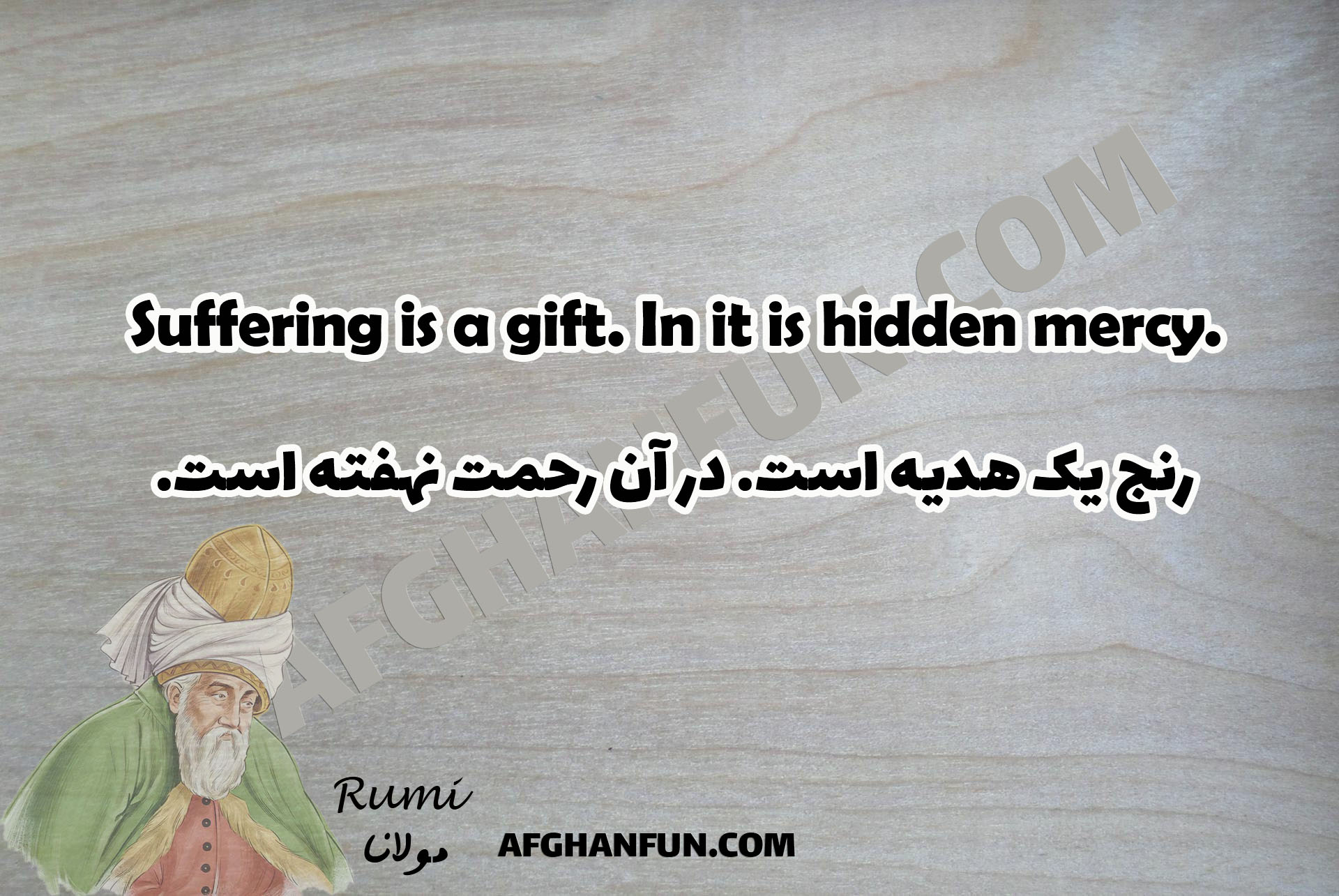Suffering is a gift. In it is hidden mercy.
Rumi
Ранҷ як ҳадя аст. Дар он раҳмат пӯшида аст.
МАВЛОНО ҶАЛОЛУДДИН МУҲАММАДИ БАЛХӢ
Ин ҷумла маънӣ медиҳад, ки дард ва ранҷ, гарчанд авлӣ сахт ва номусоид ба назар мерасанд, воқеан имкони рушди рӯҳӣ ва маърифатӣ ҳастанд. Ҳар ранҷ як раҳмати пӯшида дорад, ки ба инсон кӯмак мекунад, ки ба худаш ва ҷаҳони атрофи худ фаҳм бештар пайдо кунад.
رنج یک هدیه است. در آن رحمت نهفته است.
مولانا
این جمله به این معناست که رنج و درد، اگرچه به ظاهر سخت و ناخوشایند به نظر میرسند، در حقیقت فرصتی برای رشد و تحول روحی هستند. در درون هر رنجی، رحمت و درسهایی نهفته است که میتواند به ما کمک کند تا به عمق وجود خود پی ببریم و قویتر شویم.
المعاناة هدية. فيها رحمة مخفية.
مولانا جلال الدین محمد الرومي
هذه الجملة تعني أن المعاناة، رغم ما يبدو منها من صعوبة وألم، هي في الحقيقة فرصة للنمو الروحي. في كل معاناة هناك رحمة مخفية قد تساعد الإنسان على فهم أعمق لذاته وللحياة.
This quote by Rumi, “Suffering is a gift. In it is hidden mercy,” is a profound statement about the nature of pain and hardship. At its core, it suggests that suffering is not simply a negative experience to be avoided or resisted, but that it can contain within it something transformative and redemptive.
1. Suffering as a Gift
Rumi’s idea that suffering is a “gift” might seem paradoxical at first. We tend to think of gifts as something desirable, something we want, but suffering is generally viewed as something to be avoided. However, Rumi’s use of the word “gift” invites us to reconsider suffering’s role in our lives. In many spiritual traditions, including Sufism (which Rumi is associated with), suffering is seen as a potential pathway to spiritual growth. It is through suffering that we often experience deep shifts in consciousness, develop compassion, or confront parts of ourselves that we might otherwise overlook.
Suffering, then, becomes a “gift” in the sense that it has the potential to bring about deeper awareness, inner transformation, and a more profound connection to the divine. This doesn’t mean we should seek suffering or revel in it, but rather that we can view it as an opportunity for growth and healing, even in its most difficult forms.
2. Hidden Mercy in Suffering
The second part of the quote, “In it is hidden mercy,” points to the idea that suffering, though painful, is also a vessel for grace or mercy. The notion of “hidden mercy” suggests that there is something benevolent, even divine, within the experience of suffering, something that we may not immediately recognize but can uncover with time and understanding.
In Sufi thought, mercy is a central divine quality. It is often understood as a force of compassion, kindness, and healing that transcends our human understanding. Suffering, therefore, is seen not as a punishment, but as a means through which mercy operates. For example, through enduring suffering, a person might develop a greater capacity for empathy, become more humble, or realize the impermanence of material concerns. In this way, suffering can teach profound lessons about love, patience, and spiritual resilience.
3. Spiritual Awakening
Rumi often speaks about the “beloved” or the divine in his poetry, and suffering is sometimes described as a way to break open the heart. The idea is that we are often caught in worldly attachments or illusions, and suffering shakes us from this slumber. When we are forced to confront our pain, we may also come face-to-face with the deeper realities of life — love, impermanence, and the mysteries of existence. In this way, suffering is a bridge to a deeper, more direct experience of the divine.
4. Contextual Meaning
Rumi’s teachings often encourage embracing life’s challenges as part of a larger spiritual journey. To him, human experience — with all its ups and downs — is interconnected with the divine. Therefore, suffering is not separate from the divine but a part of it. It is this perspective that helps to reframe suffering from being merely a tragic or unfortunate event to being something that has the potential to open us up to divine mercy and grace.
Conclusion
In essence, this quote reflects Rumi’s view that suffering is not just a painful or negative experience, but something with hidden potential. If we can embrace it with awareness and openness, we may find that within it lies a kind of mercy — an opportunity for growth, transformation, and spiritual awakening. The “gift” of suffering is not the pain itself, but what it can lead to: a deeper connection with ourselves, others, and the divine.











